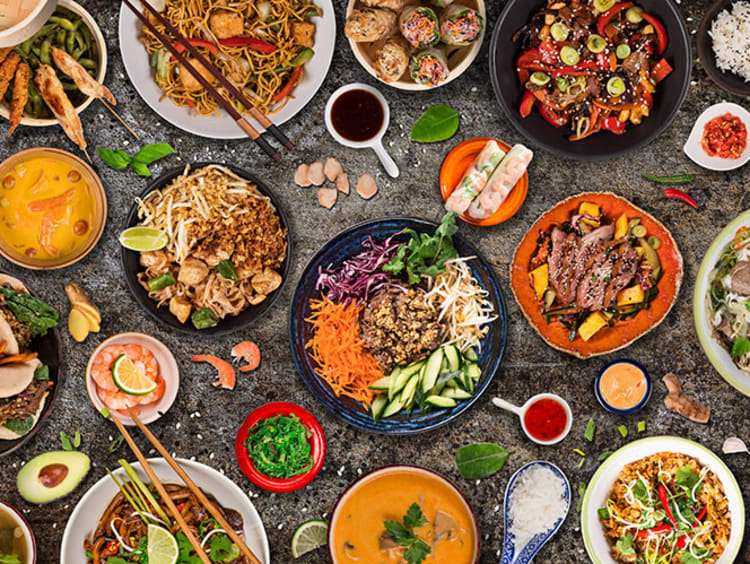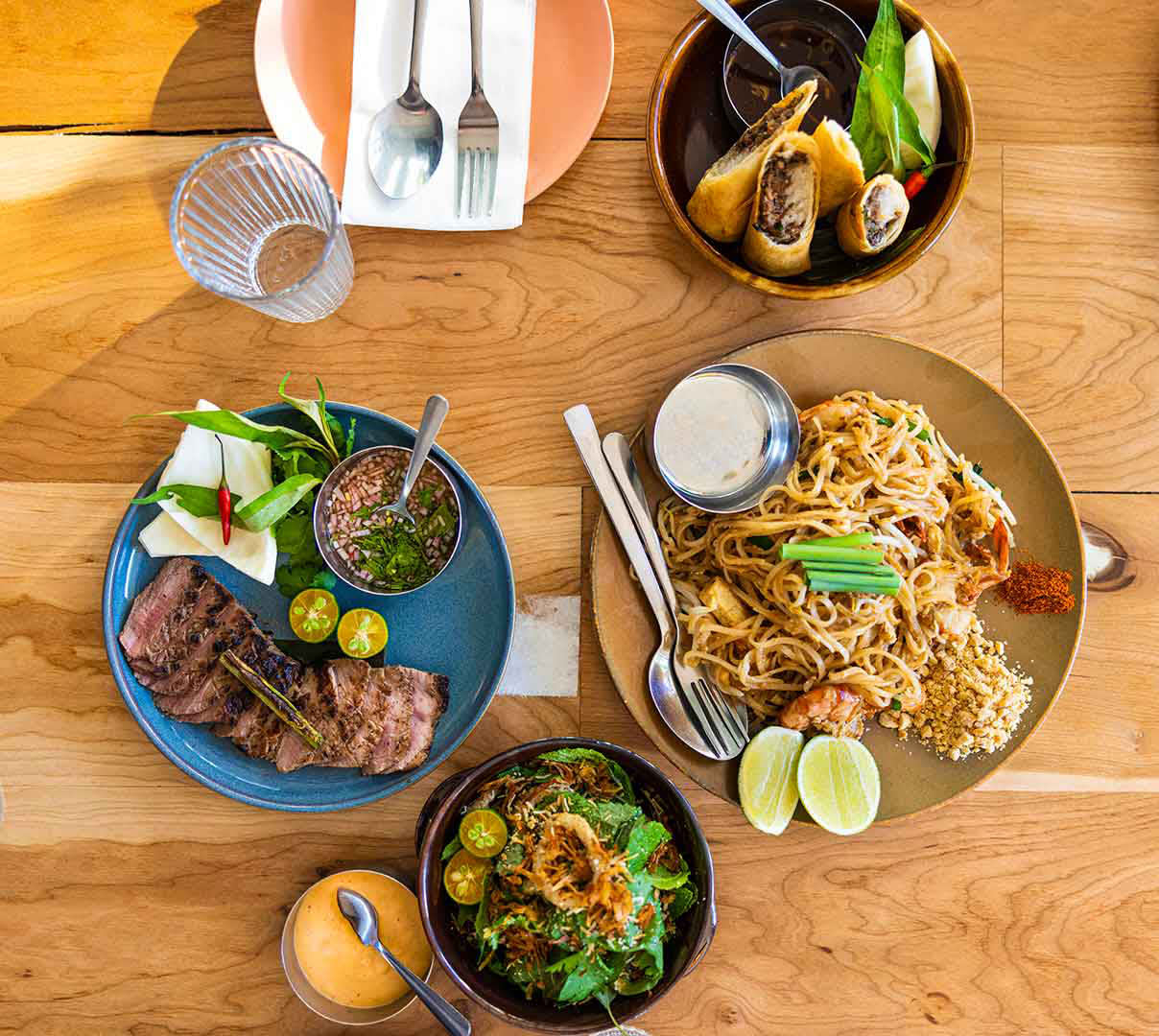Discover surprising Restaurants that offer bold flavor combinations
Discover surprising Restaurants that offer bold flavor combinations
Blog Article
Eating Delights: Discover Cutting-edge Restaurants Transforming the Food Scene
The contemporary dining landscape is experiencing an impressive improvement, noted by cutting-edge restaurants that are redefining cooking standards. From the increase of pop-up establishments embracing seasonal ingredients to immersive experiences that involve the senses in unprecedented methods, these places are setting new requirements of what it indicates to enjoy a dish. Additionally, a growing emphasis on sustainability and local sourcing shows a commitment to both high quality and neighborhood. As we check out these trends, the concern occurs: what future growths might further reshape our cooking experiences?
The Surge of Pop-Up Restaurants
As the cooking landscape advances, pop-up restaurants have actually arised as a dynamic pressure, charming food lovers and entrepreneurs alike. These momentary eating establishments, usually established in unusual rooms, offer a distinct blend of creativity and availability, interesting a diverse variety of customers. The rise of pop-up dining establishments can be attributed to numerous variables, consisting of the growing demand for novel dining experiences and the business spirit of chefs keen to examine their cooking ideas without the financial worry of a long-term location.Pop-up dining establishments allow chefs to trying out menus, designs, and styles, usually concentrating on seasonal or locally-sourced components. This flexibility not just promotes development but likewise develops a sense of seriousness, as clients are attracted to the limited-time offerings. The ephemeral nature of pop-ups cultivates a buzz around the eating experience, encouraging social media sharing and word-of-mouth promotion, which can considerably boost visibility and draw in a dedicated following.Furthermore, pop-up dining establishments commonly cater to particular niche markets, ranging from vegan and gluten-free choices to ethnic foods, thereby satisfying the diverse dietary choices of modern customers. Therefore, these establishments contribute to the abundant tapestry of the food scene, pressing borders and difficult typical notions of dining.
Immersive Dining Experiences

Lasting Practices in Cuisine
Embracing sustainability, ingenious dining establishments are redefining their culinary practices to minimize environmental influence while boosting the dining experience. These establishments prioritize neighborhood sourcing, typically teaming up with close-by farmers and manufacturers to ensure that components are fresh and seasonal. This not just lowers the carbon footprint connected with long-distance transport but likewise supports local economies.In enhancement to sourcing, dining establishments are significantly adopting practices that decrease waste. Lots of are carrying out composting systems and making use of food scraps creatively, changing what would normally be discarded into flavorful elements of brand-new recipes. As an example, veggie trimmings can find new life in stocks or garnishes, while stale bread is repurposed into croutons or bread puddings.Moreover, the pattern towards plant-based food selections is obtaining momentum (Best Restaurants). By highlighting veggies, grains, and legumes, dining establishments can considerably lower their environmental effect, as plant-based foods normally require less resources and produce much less greenhouse gas emissions compared to meat production. Ingenious cooks are crafting meals that not just celebrate these components yet likewise provide diners with an extraordinary culinary experience.Furthermore, many facilities are embracing green methods such as utilizing biodegradable packaging for takeout and investing in energy-efficient home appliances. These measures show a commitment to sustainability at every degree of operation, permitting diners to appreciate their dishes with the expertise that their selections add to a healthier world. As the food scene remains to progress, the integration of lasting practices comes to be not simply a pattern, but a required requirement for the future of dining
Tech-Enhanced Eating Journeys
Tech-enhanced eating journeys are revolutionizing the method clients experience meals, with over 70% of restaurants currently including digital technologies to raise service and engagement. These advancements are not just patterns; they are basic shifts that redefine the cooking landscape. From the moment diners go into a dining establishment, technology is flawlessly woven right into the experience, improving both ease and enjoyment.One of the most significant advancements is the usage of mobile applications for reservations and menu browsing. Diners can now view in-depth summaries, nutritional information, and also the beginnings of ingredients at their fingertips. This openness fosters notified selections and enables guests to tailor their dining experience to their preferences.Furthermore, interactive tables furnished with touchscreens give an engaging platform for ordering and entertainment. Restaurants can customize their meals, check out a glass of wine pairings, or perhaps play video games while awaiting their recipes. This assimilation of modern technology not just improves the purchasing procedure yet additionally transforms dining into a vibrant, public activity.Moreover, some facilities are utilizing augmented truth (AR) to develop immersive eating experiences. By just aiming a smartphone at a meal, patrons can visualize the ingredients and cooking approaches in an appealing way, connecting the void in between the culinary and digital worlds.As dining establishments remain to embrace these technical advancements, the dining experience comes to be progressively customized, reliable, and pleasurable. This makeover mirrors a more comprehensive trend in the direction of enhancing consumer interaction, ensuring that each dish is not almost sustenance, but a remarkable adventure in eating.
Worldwide Tastes With a Twist
The culinary landscape is significantly noted by combination food technologies that mix conventional tastes with unforeseen elements - Restaurants. Unique ingredient pairings not just enhance the dining experience but also admire cultural heritage, reimagining precious dishes in interesting brand-new ways (Eddie's Rise N' Dine Williamsville IL). This imaginative method welcomes restaurants to check out diverse international impacts while experiencing familiar tastes in a fresh context
Blend Cuisine Innovations
Creativity in the cookeries has actually led to a dynamic renewal of blend cuisine, where cooks mix diverse global tastes to produce ingenious meals that defy typical boundaries. This cooking motion transcends simple mix, concentrating on the harmonious assimilation of active ingredients and strategies from various cultures.Restaurants specializing in blend cuisine are redefining dining experiences by offering recipes that tell a tale with taste, strategy, and discussion. For example, the marital relationship of Japanese sushi with Peruvian ceviche has actually caused one-of-a-kind rolls that celebrate both culinary heritages. Indian flavors have actually located their means right into Italian pasta dishes, supplying a fascinating twist on classic recipes.Chefs are also exploring with food preparation methods, such as utilizing standard frying pan strategies to prepare Latin American stir-fries, consequently creating an abundant tapestry of tastes and textures. Seasonal schedule of active ingredients better enhances this creative process, enabling fresh analyses of classic recipes. The appeal of fusion cuisine depends on its ability to shock and joy the taste, encouraging restaurants to check out brand-new cooking landscapes while cultivating a greater appreciation for the diversity of international gastronomy.
Special Ingredient Pairings
Culinary development usually thrives on the unanticipated, and distinct active ingredient pairings are at the leading edge of this trend in the contemporary dining landscape. Chefs are significantly trying out with mixes that stun and thrill the palate, elevating the eating experience past conventional boundaries.For example, the association of sweet and mouthwatering has actually ended up being a trademark of modern food. American Restaurant. Believe of crispy duck served with a cherry and balsamic glaze, where the flavor of the cherries matches the splendor of the meat. Likewise, meals featuring miso-infused chocolate desserts display just how umami can enhance sweet taste, creating a well balanced taste profile that intrigues diners.Furthermore, the use of unusual seasonings in unanticipated contexts, such as saffron in a timeless risotto combined with lemon zest, highlights just how culinary borders can be redefined. These cutting-edge pairings not just produce aesthetic and textural contrasts however additionally welcome diners to discover a range of international tastes in a single dish.As dining establishments remain to forge ahead, the excitement of discovering new preferences with one-of-a-kind ingredient pairings guarantees to be a specifying feature of the modern food scene, welcoming daring eaters to enjoy these creative culinary dialogues
Cultural Heritage Reimagined

The Art of Multi-Sensory Meals
In the domain name of culinary innovation, multi-sensory meals are reinventing the dining experience by linking taste and aroma in enchanting means. The impact of visual discussion improves not simply the aesthetic charm but likewise the assumption of taste, while carefully curated soundscapes elevate the setting. With each other, these aspects develop an alternative experience that involves all detects, transforming exactly how customers get in touch with food.
Taste and Scent Combination
A growing number of chefs are accepting the concept of flavor and aroma blend, recognizing that a meal is not simply a mix of ingredients yet a holistic experience that engages all the senses. This ingenious method emphasizes the intricate partnership in between taste and odor, both of which substantially affect our understanding of food.Chefs are explore different techniques to enhance flavors while concurrently crafting fragrant accounts that boost the dining experience. The use of fragrant herbs and spices not just adds depth to dishes but additionally entices the olfactory detects, producing a more immersive experience. Infusions, smoke, and vital oils are progressively popular, permitting chefs to manipulate aroma and improve the overall taste profile.Moreover, the tactical pairing of corresponding and different flavors can stimulate emotional reactions, transforming a meal right into a remarkable occasion. Diners are urged to savor each bite, as the interplay of tastes and aromas unravels, inviting them to explore brand-new dimensions of preference. This thoughtful amalgamation of sensory aspects cultivates an admiration for the creativity of food, placing flavor and fragrance combination as a crucial pattern in modern-day gastronomy.
Aesthetic Presentation Influence
Beyond taste and scent, the aesthetic presentation of a dish plays a vital role in the overall eating experience. The appearances of food can evoke feelings, established the tone for the dish, and enhance the anticipation of sampling. Ingenious dining establishments are significantly acknowledging that a recipe's appearance can influence visitors' perceptions and satisfaction degrees, often also before the initial bite is taken.Artful plating methods, vivid color combinations, and creative garnishes add to a meal's visual anchor appeal. Cooks are currently educated not just in cooking abilities, but additionally in the art of discussion, commonly attracting inspiration from various creative disciplines. For example, the use of unfavorable area in plating helps to produce centerpieces, enabling the components to shine.Moreover, the trend of multi-sensory meals integrates aesthetic aspects with various other senses, such as appearance and temperature, to develop a holistic dining experience. This strategy urges restaurants to engage even more deeply with their food, transforming a straightforward dish right into a memorable occasion. Essentially, the aesthetic presentation of food is not merely an aesthetic endeavor; it is a critical part of the dining experience that can elevate a meal from regular to phenomenal.
Soundscapes in Eating
The experience of eating prolongs beyond the aesthetic elements of a meal; audio likewise plays a considerable role in shaping how food is viewed and delighted in. Cutting-edge restaurants are progressively discovering the idea of soundscapes-- curated audio atmospheres made to improve the eating experience (Eddie's Rise N' Dine Williamsville IL). The interplay of noise and taste can greatly influence a person's perception of taste, texture, and general satisfaction.Research suggests that particular sounds can magnify or reduce tastes. For instance, shrill sounds might boost sweet taste, while lower regularities can enhance anger. This sensation has actually led some chefs and restaurateurs to team up with sound designers, developing distinct acoustic backdrops that match their culinary offerings. Restaurants.In these setups, diners might discover themselves engaged in a carefully crafted sound setting, ranging from the gentle rustle of leaves to the balanced sounds of a bustling cooking area. Such multisensory dishes not only involve the taste buds yet likewise evoke psychological reactions, boosting the overall experience. By utilizing the power of audio, these innovative eating facilities are redefining the way we experience food, motivating clients to savor each bite while completely involving their senses
Community-Centric Culinary Initiatives
Frequently, innovative restaurants are redefining their duties within neighborhood neighborhoods by carrying out culinary efforts that focus on social duty and inclusivity. These facilities are progressively appealing in techniques that not just boost their service models yet additionally contribute to the welfare of their neighborhoods.One popular trend is the establishment of community cooking areas that use culinary training and task placement for underserved populations. These kitchen areas not just supply beneficial abilities yet additionally promote a sense of belonging, empowering individuals to produce their very own culinary paths. Furthermore, numerous restaurants are partnering with local farms and manufacturers, stressing farm-to-table techniques that support sustainable farming and lower carbon impacts. This not only ensures quality and top quality yet additionally strengthens regional economies.Another effort gaining grip is the concept of communal dining experiences, where varied teams integrated to share dishes and tales. This method cultivates understanding and gratitude among various societies, damaging down barriers and cultivating inclusivity. Dining establishments are increasingly taking on waste decrease approaches, such as composting and recycling food scraps, which not just addresses environmental worries but likewise encourages clients to show on their usage practices.
Frequently Asked Inquiries
Exactly How Do Cutting-edge Dining Establishments Maintain Uniformity in Food Top Quality?

What Are the Expenses Connected With Starting a Pop-Up Restaurant?
Beginning a pop-up restaurant includes numerous expenses, consisting of venue leasing, devices purchases, permits, marketing, staffing, and food materials. Furthermore, entrepreneurs must allocate unanticipated expenses to assure smooth operations throughout the endeavor's period.
Just How Do Dining Establishments Select Their Locations for Pop-Up Occasions?
Restaurants choose pop-up event locations based on target demographics, foot web traffic, access, and competition. Additionally, they take into consideration neighborhood market trends and area interaction possibilities to maximize visibility and enhance customer experience throughout the occasion.
What Effect Do Food Trends Have on Restaurant Menus?
Food fads significantly affect restaurant food selections by leading active ingredient selection, affecting dish imagination, and shaping consumer preferences. Facilities commonly adjust to these trends to enhance customer appeal, maintain competitiveness, and straighten with developing cooking expectations.
Exactly How Can Diners Support Community-Centric Culinary Initiatives?
Restaurants can sustain community-centric culinary efforts by patronizing local dining establishments, joining farm-to-table occasions, engaging with food cooperatives, promoting lasting techniques, and promoting for policies that strengthen regional food systems and improve community well-being.
Report this page